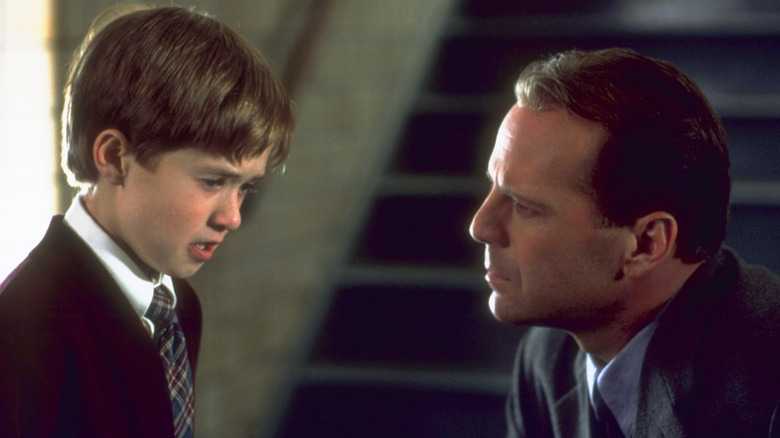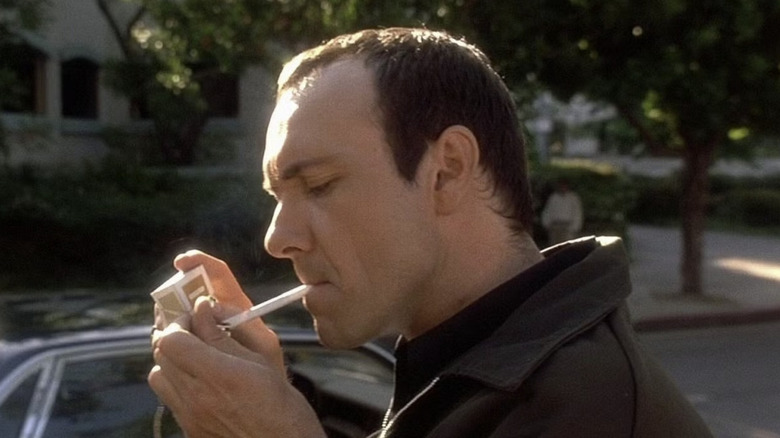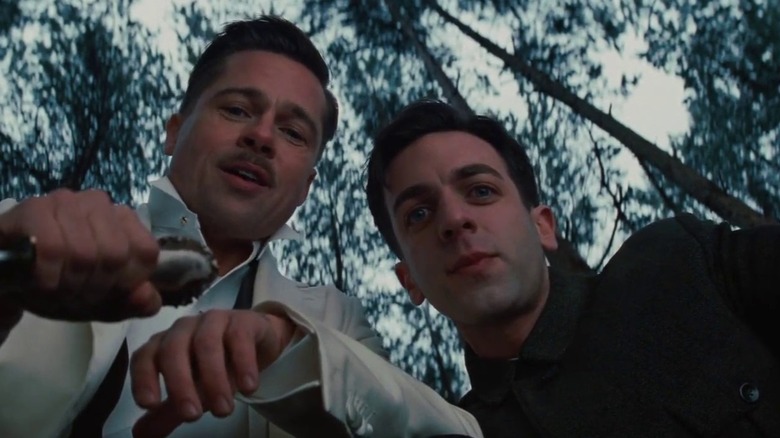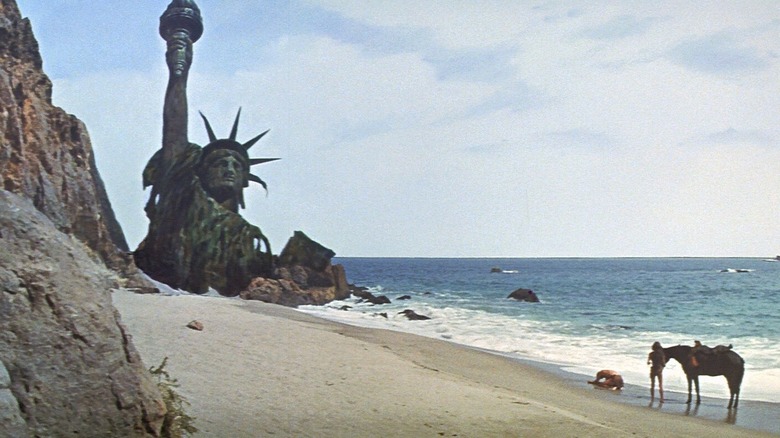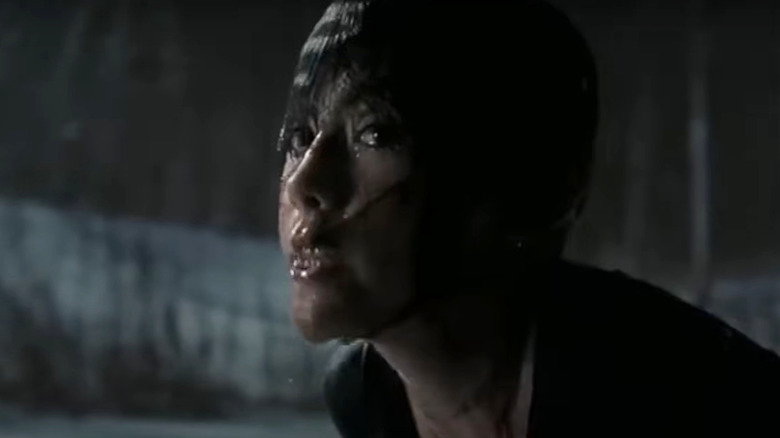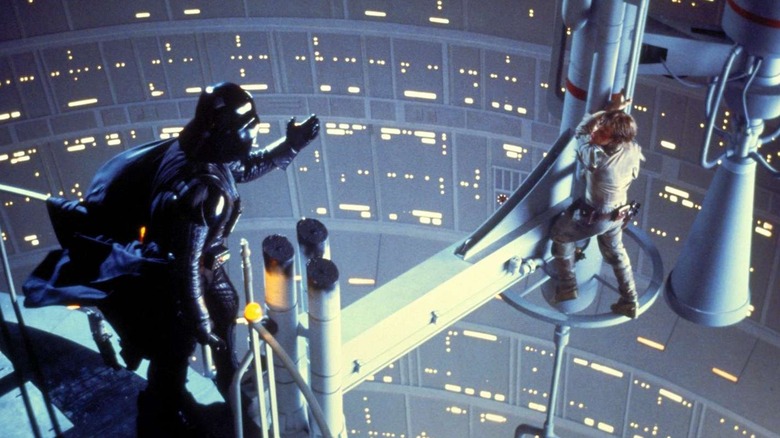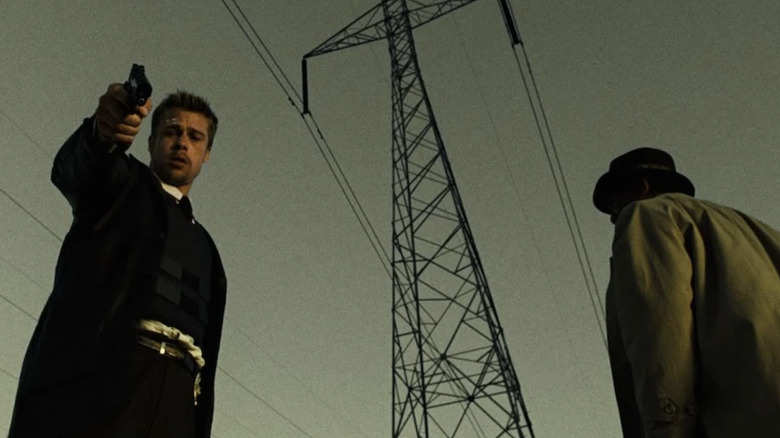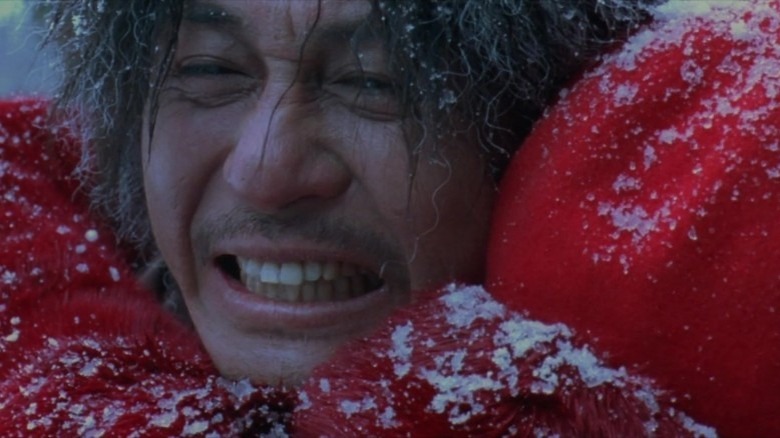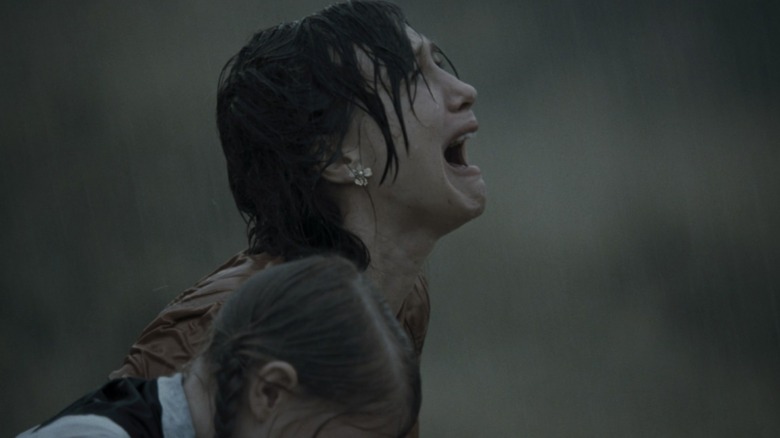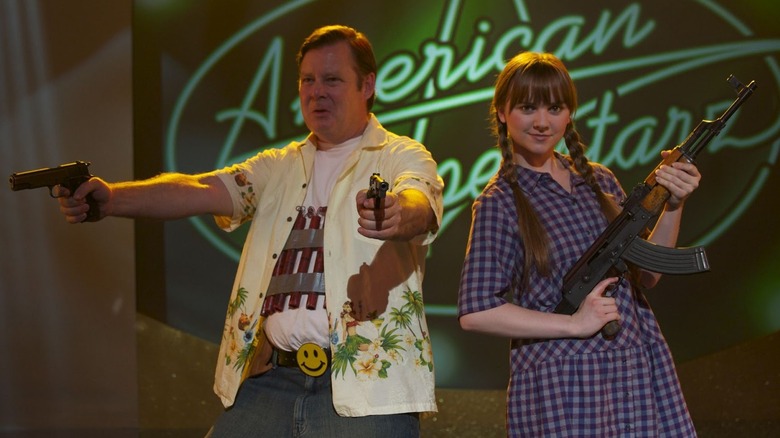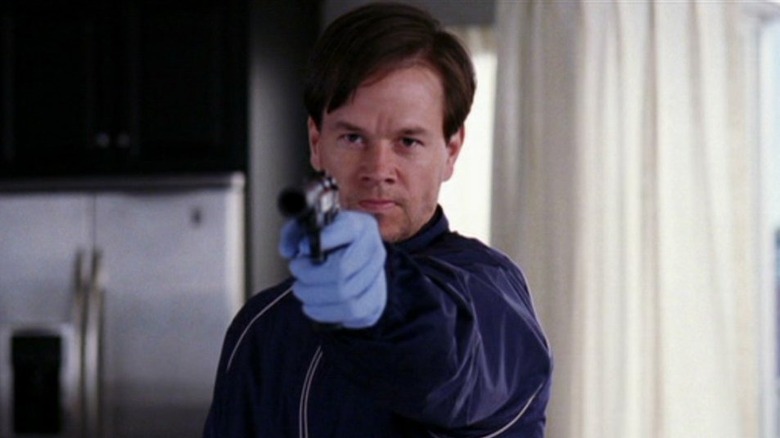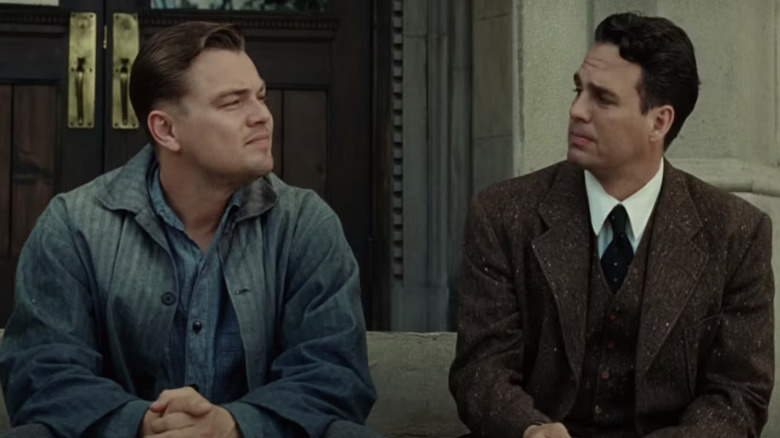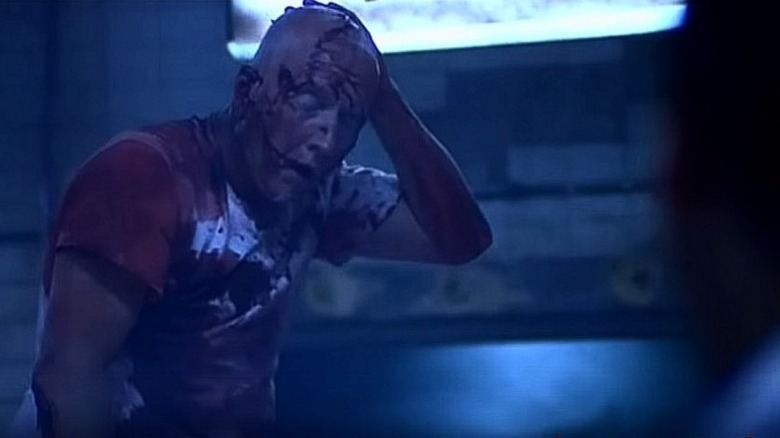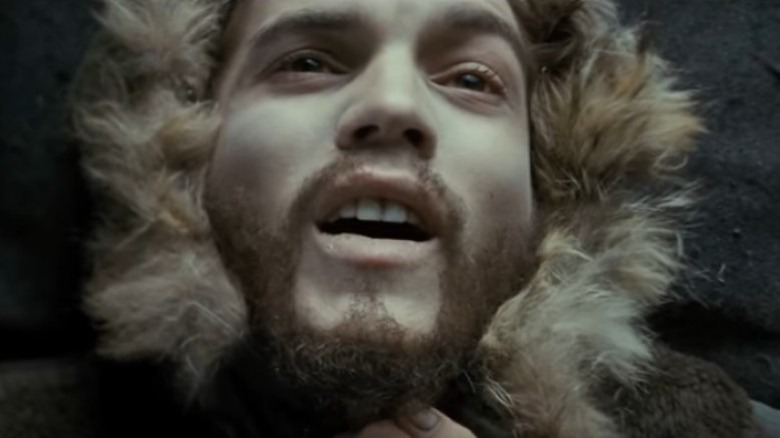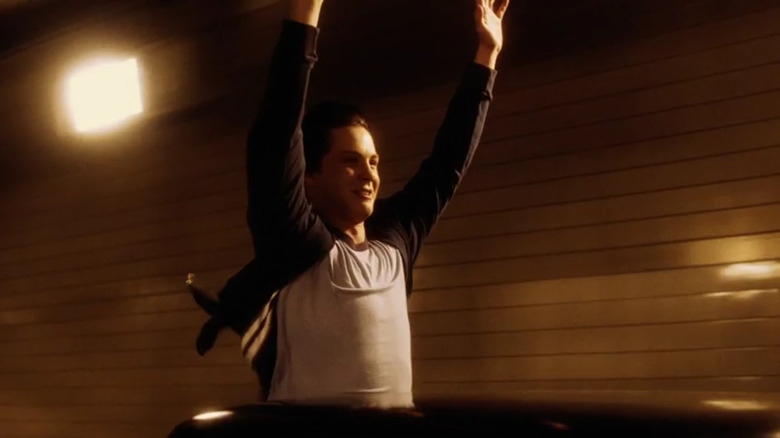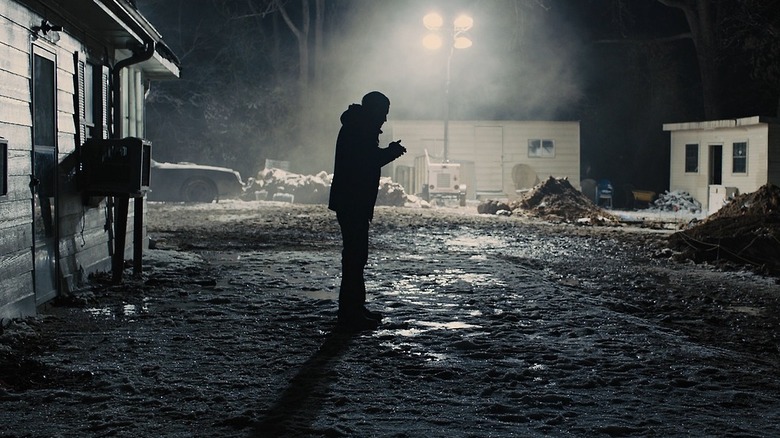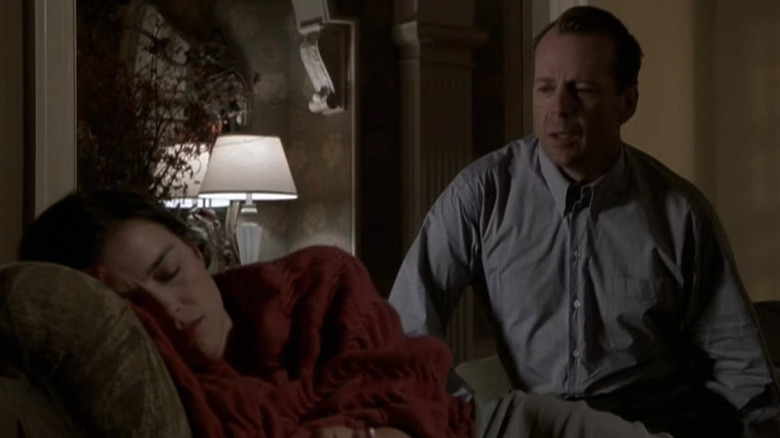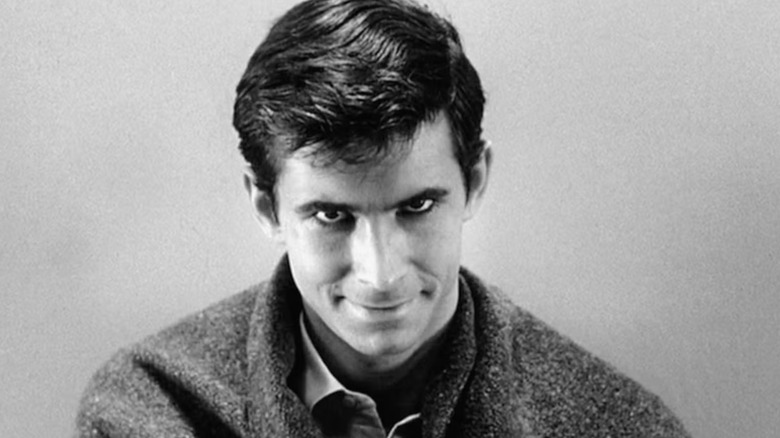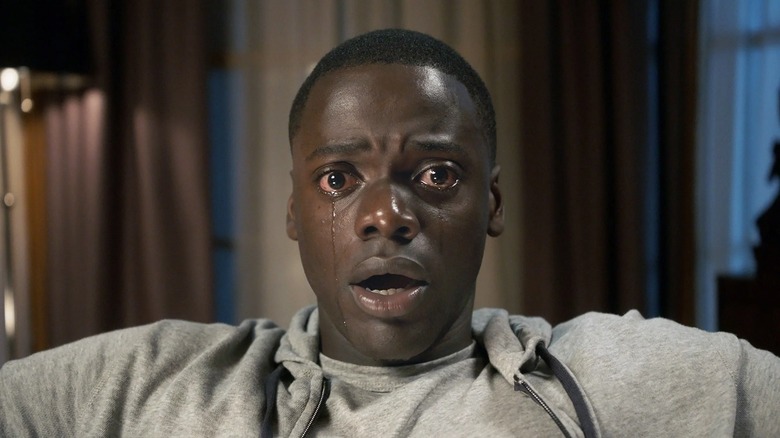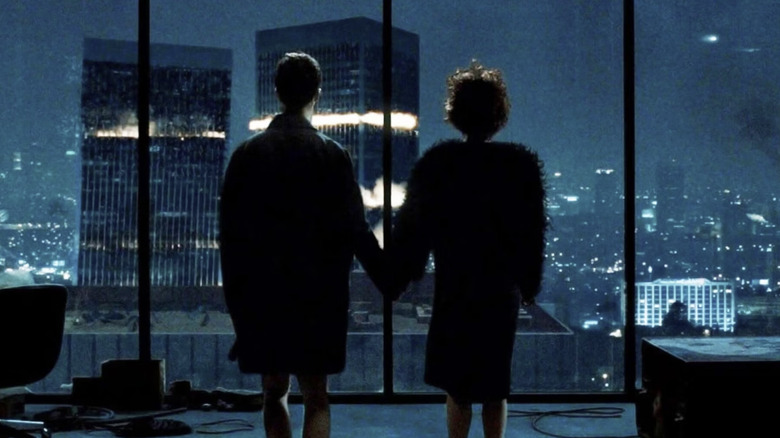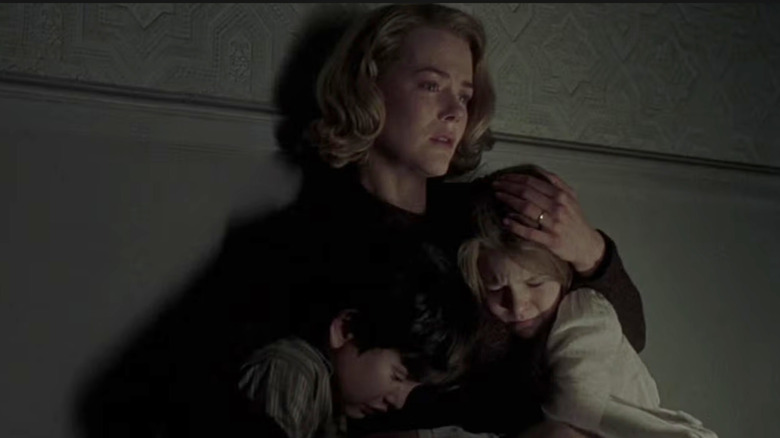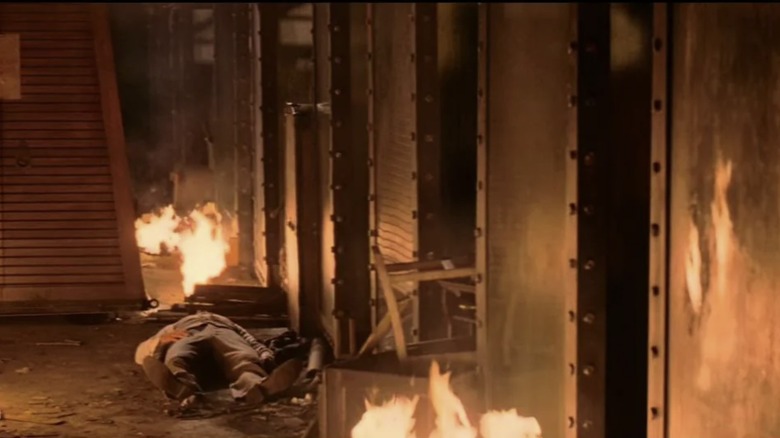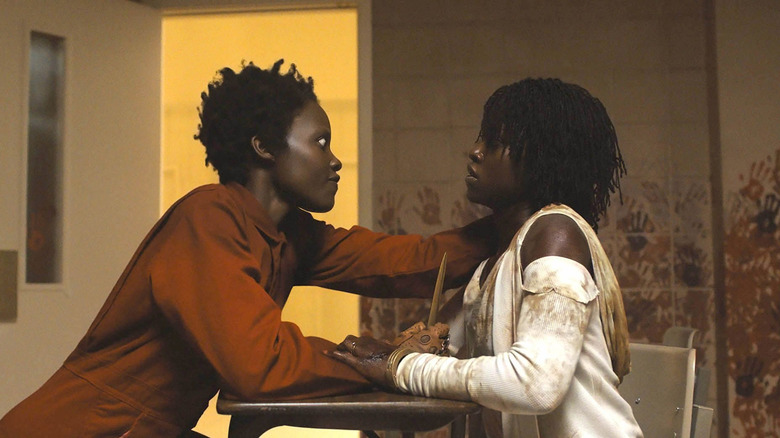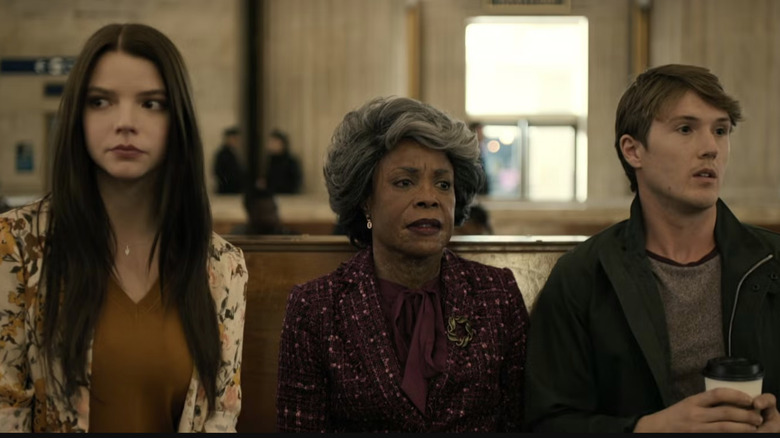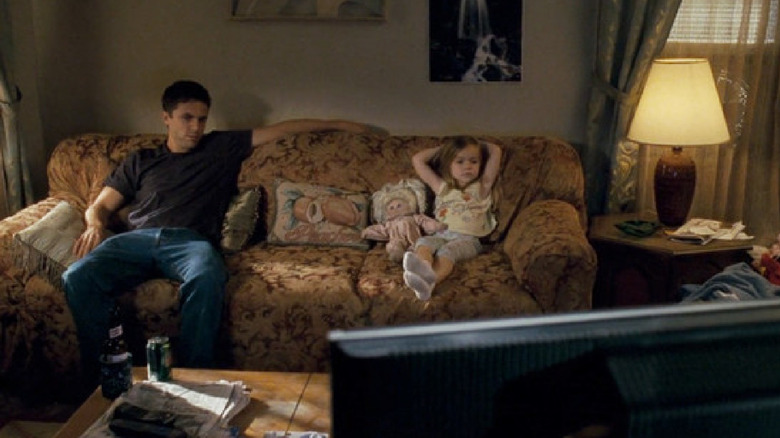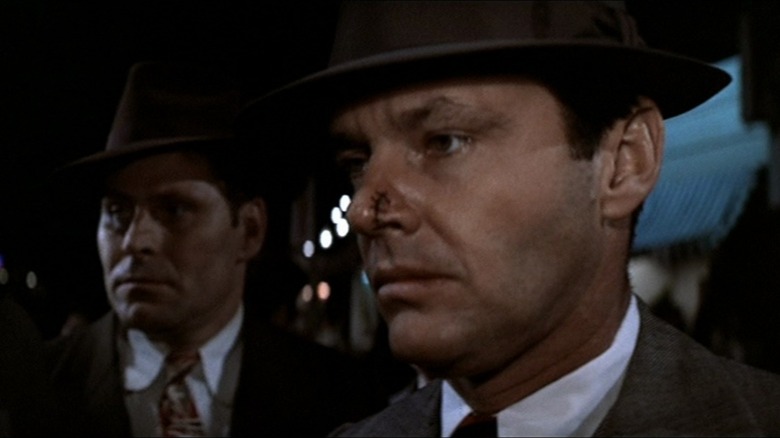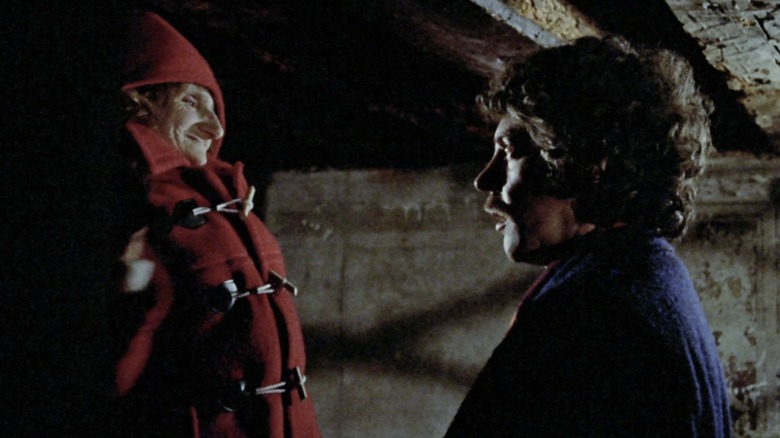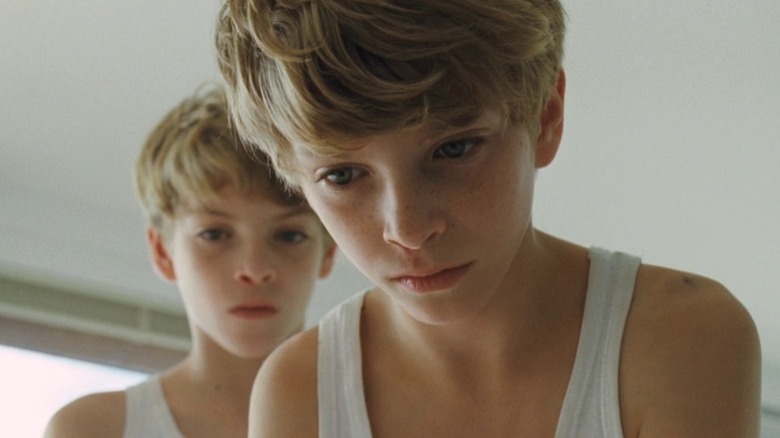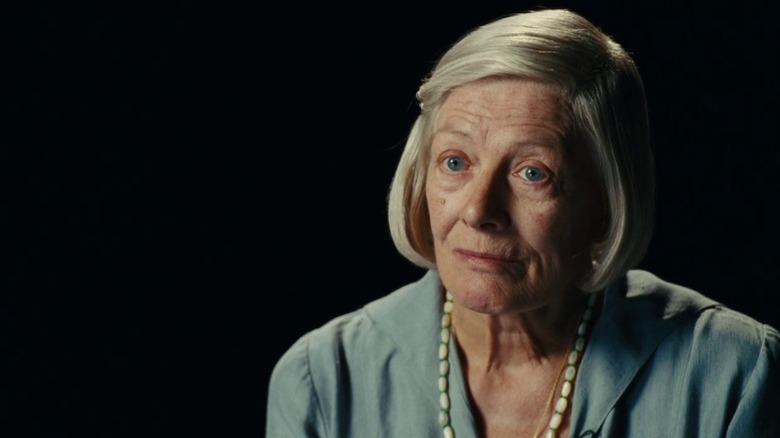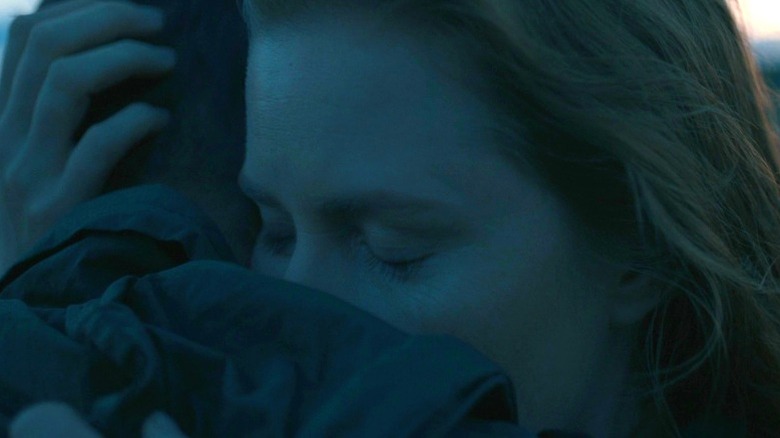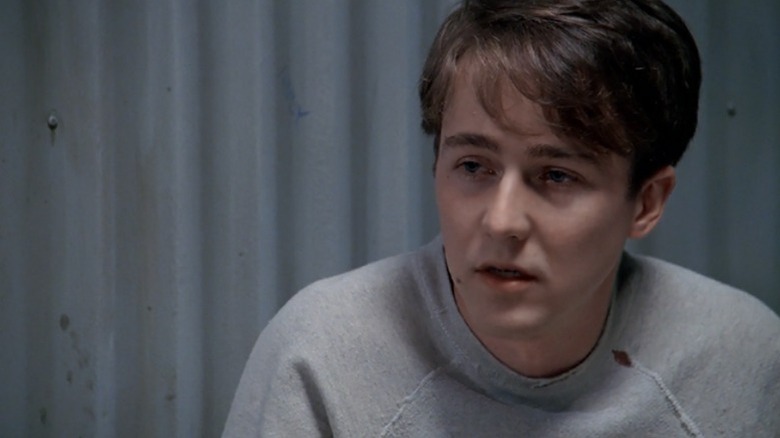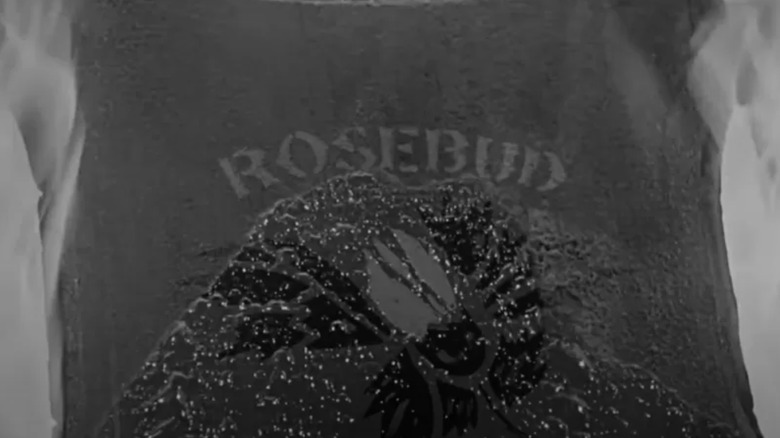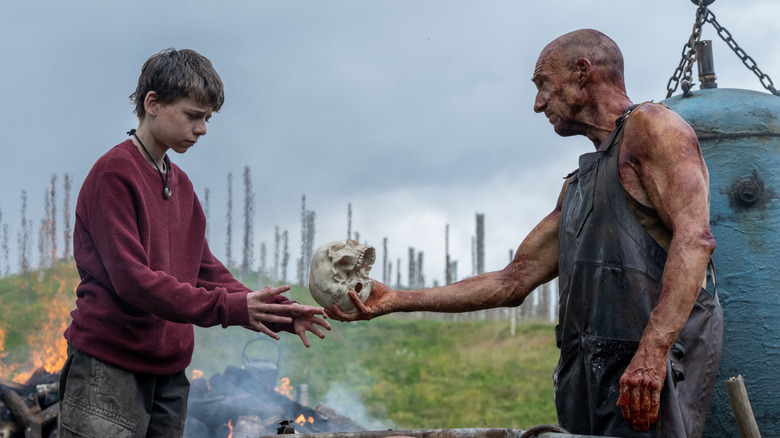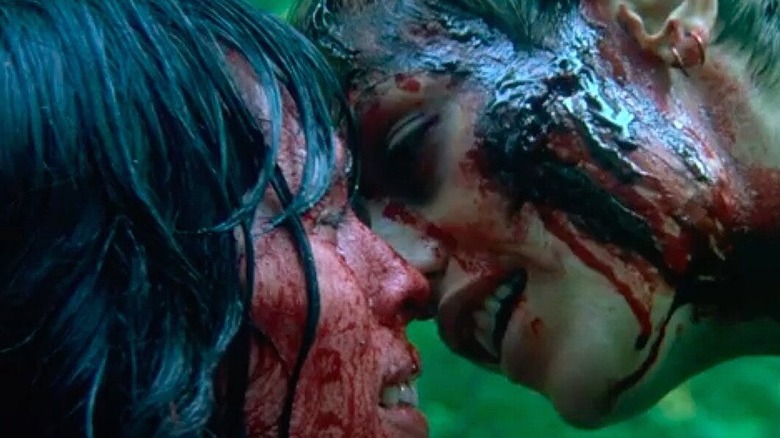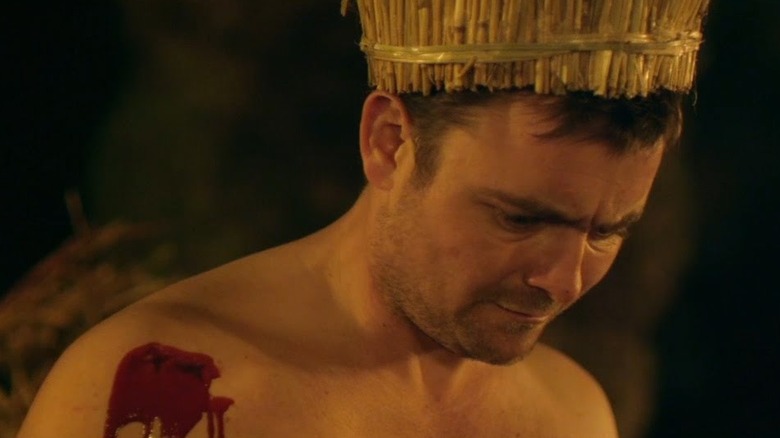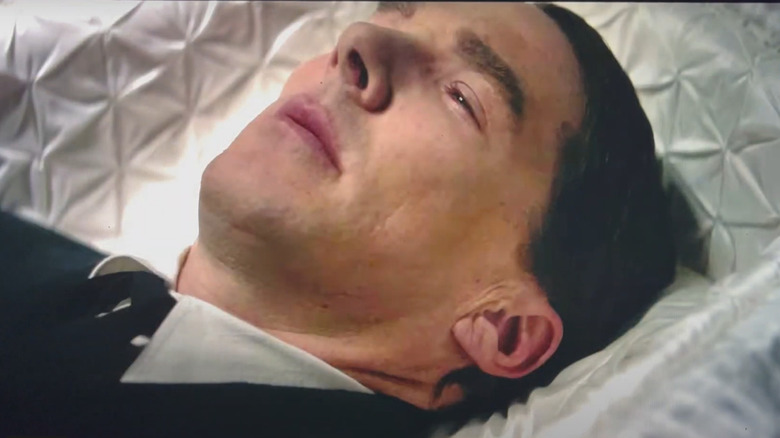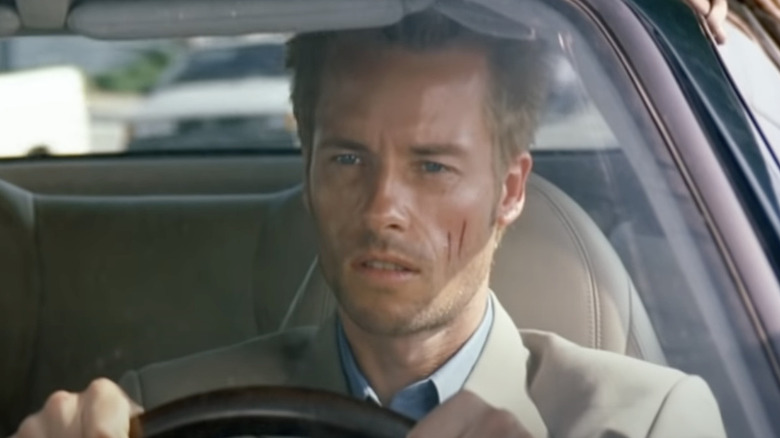The Most Shocking Movie Endings
Whether or not we care to admit it, as film fans we all love a good happy ending. Seeing the characters we've spent anywhere from 90 minutes to more than two hours getting to know ride off into the sunset is a great feeling — though sometimes a greater thrill can be found in a complete shock. There is something truly mind-bending about watching a movie in which the ending pulls the rug right out from under the audience, leaving them dumbstruck or gasping in their seats as they realize what has just happened.
In some cases, a shock or twist ending will force the viewer to recontextualize or reassess the entire experience, making them see the events of the film through an entirely new perspective. Luckily, there are plenty of directors willing to make films designed to leave the viewer utterly speechless as the credits roll. From uncomfortable family revelations to extreme acts of violence, these are some of cinema's most shocking movie endings.
The Usual Suspects
Ending with one of the most genuinely surprising twists in modern cinema, Bryan Singer's neo-noir classic "The Usual Suspects" follows the interrogation of seemingly helpless Roger "Verbal" Kint (Kevin Spacey), one of only two survivors of a devastating fire on a ship docked at the Port of Los Angeles. Spacey spins the detectives (and hapless viewers) a long and twisted tale of drugs, deceit and death, explaining that everything comes back to a mysterious mob boss by the name of Keyser Söze.
The twist? Spacey's character is Keyser Söze all along, which the officer who's been interrogating him (Chazz Palminteri) realizes just a few moments too late. As Kint exits the police station and shuffles off down the street, his awkward gait starts to straighten out and we realize we've been had. After all, the greatest trick the Devil ever pulled was convincing the world he didn't exist.
Inglourious Basterds (2009)
Quentin Tarantino's gleefully inaccurate take on the World War II thriller genre was nominated for eight Academy Awards, with Christoph Waltz taking home the Oscar for best actor in a supporting role for his portrayal of the film's unforgettable villain, Hans "The Jew Hunter" Landa. He joined an ensemble cast including Michael Fassbender, Daniel Brühl and Brad Pitt, the leader of the Nazi-killing U.S. outfit the film is named after.
First Lieutenant Aldo "The Apache" Raine (Pitt) and his Basterds go on the hunt for Nazi scalps, machine-gunning Hitler himself to pieces in the process, though the one German Raine cannot kill is Landa. After striking a deal with the top brass, the Jew Hunter is afforded his freedom in the States, though Aldo doesn't let him slide that easily. With the film all but wrapped up, Pitt pulls out his knife and proceeds to carve a swastika into Waltz's forehead in a shockingly gory close-up.
Planet of the Apes
Loosely based on French author Pierre Boulle's 1963 novel "La Planète des Singes," this seminal 1968 classic is considered one of the best sci-fi movies of all time and contains one of the most famous examples of a shock ending. Charlton Heston leads a group of astronauts stranded on a strange planet after a crash landing. The crew soon come to realize that they are not alone, however.
Apes with human-like intelligence dominate this world — with humans reduced to a state of mute savagery — and they don't take kindly to the arrival of their otherworldly guests, though it turns out Heston and his team are far from alien. As he escapes the apes and makes his way along the shoreline with returning home on his mind, he comes across the sandy remains of the Statue of Liberty and discovers he's been on Earth the whole time, trapped in a future devastated by nuclear war.
Orphan
A film containing one of the creepiest shock twists in recent years, "Orphan" follows a couple (Vera Farmiga and Peter Sarsgaard) trying to move on with their lives after the death of their unborn child. In an attempt to save their marriage, the pair decide to go ahead with their plans for a third child, adopting a quiet nine-year-old Russian girl named Esther (Isabelle Fuhrman).
At least, they're led to believe she's nine. In truth, Esther is a 33-year-old woman named Leena Klammer, a psychopath with a growth disorder who's spent the majority of her life posing as a pigtailed child and being repeatedly adopted. Why does she need to keep finding new families? She keeps trying to get it on with the dads. We watch in sheer horror as Esther sets about seducing her new father and proceeds to kill him when he isn't receptive.
The Empire Strikes Back
The first "Star Wars" sequel, released in 1980, picked up three years after the destruction of the Death Star, the exciting climax of the first film. Luke Skywalker (Mark Hamill) and the Rebel assault squadron bearing down on the superweapon's weak spot remains a memorable finale, though it pales in comparison to the closing stages of "The Empire Strikes Back," known for its double-blow ending.
Han Solo (Harrison Ford) being frozen alive in carbonite by Darth Vader (Dave Prowse) was quite the shock for fans of the dashing pilot, though the real jaw-dropper comes when Luke arrives at Cloud City, spurred on by a premonition of Han and Leia (Carrie Fisher) in pain. The young Jedi falls right into Vader's trap, losing his hand during their ensuing lightsaber battle and still refusing to join the dark side of the Force. In a moment that would be quoted, referenced and parodied countless times over the following decades, Vader reveals to Luke that he is actually his father.
Seven
David Fincher's macabre thriller "Seven" is crammed full of shocking moments, with every discovery of a new victim churning the stomach that little bit more. The mutilations become increasingly horrific as a serial killer inspired by the seven deadly sins picks off those he deems guilty of committing them. But one scene in particular sticks long in the memory, however, and that's the film's haunting finale.
After veteran detective William Somerset (Morgan Freeman) and his new partner David Mills (Brad Pitt) finally manage to corner the killer (Kevin Spacey), they discover a box containing the head of Mills' pregnant wife Tracy (Gwyneth Paltrow). Despite it being exactly what the killer wants (for Mills to complete the killing by becoming "Wrath"), the heartbroken detective guns down the skinheaded madman in a shocking climax that, unlike other scenes, didn't actually rely on gore; Paltrow's severed head is never actually shown, despite many viewers coming away swearing they saw it.
Oldboy
South Korean director Park Chan-wook made inroads in Hollywood in 2013 after helming the English-language psychological drama "Stoker." While it drew decent reviews from critics (earning a 70% rating on Rotten Tomatoes) most reviewers agreed that Park's best work was done domestically, and the jewel in his Korean filmography is undoubtedly "Oldboy."
The film follows a drunk named Oh Dae-su (Choi Min-sik) who's framed for the murder of his wife and imprisoned in an iron-doored hotel room by an unknown man. When he's randomly released 15 years later, he aims to track down his captor with the help of a young female sushi chef named Mi-do (Kang Hye-jung) who takes him in after his ordeal. The woman and Oh Dae-su fall for each other and begin a sexual relationship, though unbeknownst to the pair this is all part of the captor's grand plan. Oh Dae-su and the young woman are actually father and daughter, which Oh's tormentor takes great pleasure in revealing.
The Boy In The Striped Pajamas
Those who had read John Boyne's novel going into this movie adaptation were better prepared for the shocking ending than most, but even then it would have been hard not to tense up the moment young Bruno (Asa Butterfield) and his new Jewish friend Shmuel (Jack Scanlon) start heading in the direction of the gas chambers. The film follows these two eight-year-old boys, one the son of a high-ranking Nazi stationed at a German countryside manor house, and the other a prisoner at the camp situated directly behind that house.
Not fully understanding the events going on around them, the pair become friends, and when Shmuel's father "goes missing," Bruno offers to help find him, donning a prisoner's uniform and entering the hell of the camp, never to return. It's a shocking and highly effective ending, though it is actually historically inaccurate, with the truth being even more shocking: There were no boys that age in that camp, as the Nazis immediately gassed those not old enough to work.
God Bless America
Best known as "the one with the funny voice" from the "Police Academy" movies, Bobcat Goldthwait really should get more credit for the work he's done behind the camera. He has a well-crafted, slow-burning horror on his résumé in 2013's "Willow Creek" and was able to get a fine tune out of the late Robin Williams in "World's Greatest Dad," which Film4 called "a startlingly excellent dark comedy." Between these two features, he directed another movie — one with a real shock ending. "
"God Bless America" follows Frank (Joel Murray), a terminally ill man who's had just about enough of celebrity obsession and the decline of American culture, and Roxy (Tara Lynne Barr), a high school student with a similarly weary worldview. Together they embark on a nationwide rampage, gunning down rude civilians and celebrities alike. We always expect Frank to go down in a hail of bullets, but it's a shock to see schoolgirl Roxy also torn apart by police marksmen during a shootout at an "American Idol"-style TV talent show.
The Departed
A loose remake of 2002 Hong Kong crime thriller "Infernal Affairs," Martin Scorsese's best picture winner "The Departed" moves the action out of Asia and brings it to Boston, home of notorious Irish mob boss Whitey Bulger — the inspiration behind Jack Nicholson's character, Frank Costello. The veteran gangster relies on a his police mole Colin Sullivan (Matt Damon) to stay ahead of the game, though he doesn't realize he also has a double agent in his ranks.
Billy Costigan (Leonardo DiCaprio) spends time in prison on a fake assault charge to make his cover more believable, though it doesn't do him much good in the end. After finally exposing Sullivan and slapping the cuffs on him, Costigan is shot in the head by another of Costello's moles, though we've come to expect this level of violence (while still shocking) from Scorsese. What we don't expect is Staff Sergeant Dignam (Mark Wahlberg) showing up right at the final moment after all the dust has settled to put a bullet in Sullivan's temple.
Shutter Island
Another MartinScorsese-Leonardo DiCaprio collaboration with a shocking ending, psychological thriller "Shutter Island" follows U.S. Marshal Teddy Daniels (DiCaprio) and his new partner Chuck (Mark Ruffalo) as they visit Ashecliffe Hospital for the Criminally Insane to investigate the disappearance of a woman incarcerated there for drowning her children. While perhaps not the directors' best, Scorsese still delivered what MTV called a "brilliantly constructed mystery" that leads viewers down a winding path with an unexpected end.
Just as Teddy believes he's about to solve the puzzle of the missing woman, he discovers his real name is Andrew Laeddis and he's actually a patient at the hospital, sent there for murdering his wife after she drowned their children while suffering from manic depression. The whole investigation is a ruse by Andrew's psychiatrist (Ruffalo), designed as a last-ditch effort to snap Laeddis out of his conspiracy-obsessed insanity.
Saw
After 10 installments, some of which have been of questionable quality, the "Saw" franchise has become known mainly as an exercise in cheap thrills and torture porn. As a standalone film, however, the "loathsome and extravagantly twisted" (via The Guardian) original drew comparisons to David Fincher's "Seven," and ended in similarly shocking fashion.
Most of the movie takes place in a dilapidated subterranean bathroom where a photographer (Leigh Whannell) and an oncologist (Cary Elwes) have been chained up and instructed to kill each other by an unknown captor. A dead man lies between them for the duration, becoming part of the scenery until the final moments when the bloodied corpse suddenly stands up, revealing himself to be the killer known as Jigsaw (Tobin Bell). It's a unique and totally unexpected ending that manages to be more shocking than all the B-movie gore that comes before it.
Into The Wild
Based on the life and travels of American hiker Christopher McCandless, Sean Penn's "Into The Wild" is a biographical survival film that spends 148 minutes building up to a happy ending that never comes. Through a non-linear timeline we watch McCandless (Emile Hirsch) living in complete isolation in the Alaskan wilderness intercut with the steps he took to get there, abandoning his comfortable existence to hit the road and be closer to nature.
As the film draws to an end and the harsh winter sets in, McCandless begins to realize that true happiness can only be shared with others and plans to return home to his family, though the river he crossed four months earlier has become impassable. On the point of starvation, the young backpacker is forced to gather roots and plants to eat, accidentally consuming a poisonous one in the process. He crawls into his sleeping bag to die.
The Perks of Being A Wallflower
Writer-director Stephen Chbosky wasn't just aiming to make another teen-centric indie flick when he decided to adapt his own novel for the big screen. He wanted to make his story about young people's mental health a more "communal experience" (via The Guardian) in the hope of reaching more of those affected by the themes. The film itself is well acted by leads Logan Lerman, Emma Watson and Ezra Miller, though it's hard to put your finger on what was good about their performances when all you can think about as the credits roll is the shock ending.
Troubled protagonist Charlie (Lerman) has been through the ringer and is about to get the girl (Watson), though when she touches his leg he has a flashback of his late Aunt Helen. Charlie finally admits to a psychiatrist that he's been repressing memories of the sexual abuse he suffered at his aunt's hand before she died in a car crash. Despite that grim revelation, the film ends on an uplifting note as Charlie stands up in the back of a moving truck, feeling relieved to be alive.
If you or anyone you know has been a victim of sexual assault, help is available. Visit the Rape, Abuse & Incest National Network website or contact RAINN's National Helpline at 1-800-656-HOPE (4673).
Prisoners
Denis Villeneuve's abduction thriller "Prisoners" follows desperate dad Keller Dover (Hugh Jackman) as he hunts his daughter's kidnapper, though while he finally succeeds in solving the mystery of her disappearance, the audience is left with a huge unanswered question of their own. Dover gets himself locked in a backyard underground bunker by the kidnapper, with his only hope of survival being the tenacious Detective Loki (Jake Gyllenhaal).
The bunker's entrance is covered by a truck, and Loki is about to unwittingly leave Dover to rot when the latter begins to frantically blow a whistle. Loki stops as if he hears something, and then we fade to black, with Dover's fate left unknown. It's the kind of shocking ending that has audiences waiting for a post-credits explanation, though one is never offered.
Screenwriter Aaron Guzikowski even admitted to Buzzfeed that he expected studio resistance to the planned final scene: "I was very surprised that we were allowed to keep that ending. I was surprised I was able to get the movie made, actually."
The Sixth Sense
If there's one director known for an obligatory shocking ending, it's M. Night Shyamalan, a man who enjoys nothing more than lulling his audience into a false sense of security only to flip the world he's created on its head. He did it to great effect in 2000's "Unbreakable" and 2004's "The Village," though his most famous shock ending came in his first major success, 1999's "The Sixth Sense."
The story follows a kid named Cole (Haley Joel Osment) as he tries to come to terms with the fact that he can see dead people through sessions with a troubled child psychologist (Bruce Willis). Unless you've been living under a rock, you already know that Willis' character is actually dead the whole time, and when the film first came out stories of its shocking finale spread like wildfire. Word of mouth helped this small-scale supernatural horror bag six Oscar nominations and a staggering worldwide box office total of $673 million.
The Mist
Frank Darabont's adaptation of the Stephen King novella "The Mist" caused controversy before it was even released, due to the director choosing to go with a different ending. King fans were put at ease when the author gave his approval of the changes, though only a man who has spent a lifetime delving into the bleak could claim to enjoy it.
The film follows a group of people trapped in a supermarket by a deadly mist full of tentacled creatures, one of whom is dad David (Thomas Jane). In the end, David and his young son manage to escape in a car, though when they run out of gas the father is forced to use his remaining four bullets on his child and passengers. After shooting them all, he steps out of the car to accept his gruesome fate at the hands of the monsters, only for the mist to clear and the U.S. Army to appear. The shock ending was so powerful that it left viewers fighting back the urge to punch their TV screens.
Psycho
One of the first filmmakers to truly understand the art of the twist, Alfred Hitchcock's particular brand of suspense earned him the well-deserved nickname the Master of Suspense, something he delivered consistently over a distinguished career spanning more than five decades. Perhaps his most famous shock ending is the one he filmed for "Psycho," the story of Norman Bates (Anthony Perkins) and his family's motel.
While Janet Leigh being slashed in the shower is undoubtedly the movie's best-known scene, the most shocking moment comes in the closing stages, when we finally realize Norman's mother has been dead all along and he's been committing murders dressed in her clothing. Hitchcock went to great lengths to keep the twist a secret, swearing the cast and crew to an oath of secrecy and imploring the public to keep quiet about Bates via the film's advertisements.
Get Out
Jordan Peele's directorial debut "Get Out" was the most profitable film of 2017, generating an incredible 630% return on initial investment. Made for a modest budget of $4.5 million, Peele's social thriller raked in over $255 million at the worldwide box office. A number of factors contributed to its success, but it was the movie's shocking ending that guaranteed it would live long in the memory.
When Chris (Daniel Kaluuya), a young Black man, meets the parents of his white girlfriend Rose (Allison Williams) for the first time, we soon come to realize that something isn't quite right with her family. After Chris meets a peculiar Black guest at the family's garden party, viewers are led to believe that the protagonist is about to be brainwashed into some kind of modern-day slavery, but the final reveal is even more mind-blowing: It turns out Chris is in the clutches of the Order of Coagula, a cult that transplants the brains of old, rich white people into the bodies of young Black people.
Unlike those that came before him, Chris manages to escape this awful fate, stuffing his ears with cotton to avoid being hypnotized. He fights his way outside and is ultimately rescued by his best friend Rod (Lil Rel Howery). This wasn't the original ending, however — Peele shot a version in which the cops show up instead of Rod and an innocent Chris is jailed for killing his kidnappers.
Fight Club
It's considered a cult classic today, but "Fight Club" bombed when it hit cineplexes in 1999. The gritty David Fincher flick (based on Chuck Palahniuk's novel of the same name) was the victim of a mismanaged marketing campaign by a studio that just didn't know what to do with it.
According to "Fight Club" producer Art Linson, execs at Fox were "flopping around like acid-crazed carp wondering how such a thing could even have happened" when they saw the first cut (via Den of Geek). Many critics had a similar reaction, but word of mouth helped turn the film's fortunes around — DVD sales were outstanding, pushing Fincher's film into the black. Those who weren't put off by the negative reviews couldn't help but discuss the film's hyper-violence, nihilistic message, and shocking twist ending.
"Fight Club" follows Ed Norton's unnamed Narrator, a man working a job he hates to buy things he doesn't need. After his apartment is blown to smithereens in an explosion, he moves into a rundown house with Brad Pitt's Tyler Durden, his opposite in every way — cool, focused, and ready to tear the world down. The fight club they start morphs into a full-blown anti-capitalist terrorist cell. By the time the Narrator realizes that he and Durden are the same person, it's too late to stop the plan they've put in place. The movie ends with the destruction of the city's financial district, wiping out everyone's debt.
The Others
The fact that Alejandro Amenabar's "The Others" managed to shock audiences even though it dropped just two years after M. Night Shyamalan's "The Sixth Sense" is a testament to Amenabar's deft approach to the horror genre. The Spanish-Chilean filmmaker told Combustible Celluloid that when he wrote the script, he began with the twist ending. He then wrote the beginning, and finished with "all the stuff in the middle." When you watch "The Others" again, you realize that the first two acts are full of subtle hints at what's to come, but the finale left the majority of first-time viewers in shock.
Set in the immediate aftermath of World War II, the film follows Nicole Kidman's Grace, a devoutly religious woman who moves into a remote island house with her two children. Grace's daughter has repeated encounters with an otherworldly family (the eponymous "others") who claim the house belongs to them. Grace is skeptical to begin with, but when she witnesses a piano seemingly playing itself, she becomes convinced that the old Victorian mansion is haunted. She's correct, of course, but she and her kids are the ones doing the haunting — it turns out Grace murdered her children, and all three of them are ghosts.
It's a shocking, but well-earned twist. "Most of the time it's not about the surprise, but how you set up the surprise, so that when you get there, everything makes sense and it's integrated with the soul of the story," Amenabar told Hollywood.com.
The Prestige
Christopher Nolan's movies are about much more than just shocking twists, but the director does love a good misdirect. From "Memento," his out-of-sequence psychological thriller, to "Interstellar," his mind-boggling sci-fi epic, Nolan has become well-known for his surprising third acts. While the aforementioned films are great examples of this, the high-concept, head-scratching twists they end on dilute the shock factor somewhat. That wasn't the case with "The Prestige," a less complicated (but equally gripping) period movie that left audiences reeling from an unexpected double blow.
"The Prestige" follows Robert Angier (Hugh Jackman) and Alfred Borden (Christian Bale), rival magicians vying for dominance in 19th century London. Angier becomes obsessed with figuring out his opposite number's "Transported Man," a trick in which Borden steps into a wardrobe and exits from an identical one at the opposite end of the stage. Angier is led to believe that Borden has been using a teleportation machine invented by Nikola Tesla, but the truth is far less scientific — Borden is actually a set of identical twins who have been living as one person. That's only part of the surprise, however.
We discover that Angier has actually been using Tesla's machine to do the trick for real. Every time he uses it, he creates a clone of himself. One basks in the applause of the audience, while the other is trapped in a tank and drowned. In the final moments of the movie, we see row upon row of dead Angier clones as the theater is set ablaze.
Us
Jordan Peele's follow-up to "Get Out"was less a thought-provoking social thriller and more a straight-up horror movie, but the ending was just as shocking. 2019's "Us" begins with a little girl named Adelaide wandering off from her parents and entering a spooky beachfront funhouse, where she meets her doppelgänger. When her parents finally locate her, she's unable to speak. Fast forward a few decades and Adelaide (Lupita Nyong'o) is all grown up, but remembers that day all too well.
When her husband (Winston Duke) suggests going on a family vacation to the same beach, she reluctantly agrees. Before long she realizes that she should have listened to her gut. Adelaide, her husband, and her two kids are soon terrorized by a family of red jumpsuit-wearing doppelgängers. It turns out that every one of us has a mute double living in the abandoned, forgotten (but very real) underground tunnels that span the length of the United States. That's not the big twist, however.
In the final moments of the movie, it's revealed that Adelaide's double choked her out and switched with her the day they came face to face in that hall of mirrors. The leader of the Tethered is actually the real Adelaide, which is why she's the only one who can speak. "This movie's about maybe the monster is you," Peele said on the Empire podcast (via Vice). "It's about us, looking at ourselves as individuals and as a group."
Glass
2016's "Split" marked a return to form for M. Night Shyamalan, grossing almost $280 million. The film itself didn't have a typical Shyamalan twist, but an extra scene that played at the end of the movie confirmed that it was actually a sequel to 2000's "Unbreakable," sending fans into hysterics. The final installment in the trilogy, 2019's "Glass," didn't do very well with the critics, but it delivered on the shock factor.
"Glass" reunites Bruce Willis and Samuel Jackson's "Unbreakable" characters, David Dunn (aka the Overseer) and Elijah Price (aka Mr. Glass). Both are banged up in a psychiatric ward alongside James McAvoy's Kevin Wendell Crumb (aka the Horde), a man suffering from an extreme case of dissociative identity disorder. All three are under the care of Dr. Ellie Staple (Sarah Paulson), a psychiatrist who specializes in patients who have become convinced that they have superhuman abilities. Staple spends the majority of the film attempting to convince the men that they're delusional, and she's pretty convincing. At times, against our better judgment, we believe her.
Of course, she's wrong. It transpires that Staple is part of a secret society that has been actively repressing super-powered people for years. Price is killed by the Beast, and Staple's men murder Dunn and Crumb. There's one final twist, however — Price hacked the institution's security cameras. Footage of Dunn and Crumb's super-powered showdown is leaked to the public, revealing the existence of superhumans to the world.
Gone Baby Gone
The ending of Ben Affleck's directorial debut, "Gone Baby Gone," was divisive to say the least. The movie, based on Dennis Lehane's novel of the same name, is about the kidnapping and subsequent search for missing child Amanda McCready (Madeline O'Brien). Private investigators Patrick Kenzie (Casey Affleck) and Angie Gennaro (Michelle Monaghan) are hired to find her, and they do — she just isn't where you'd expect her to be.
We're led to believe that an associate of Amanda's degenerate mother is responsible, but it turns out that retired police captain Jack Doyle (Morgan Freeman) took the girl, believing that she'd have a far better life with him rather than growing up in a rundown part of Boston with an unfit mother.
Fans of the movie are still arguing about what comes next. When Kenzie discovers the truth, Doyle attempts to convince him that he should walk away and allow Amanda to grow up under his care. Gennaro, Kenzie's romantic and professional partner, agrees with the former cop, and threatens to leave Kenzie if he takes the girl back to her drug-abusing mother. He takes her home anyway, believing it's the right thing to do. "You see the squalor the girl lives in and your heart goes out to her for where she used to live, not only where she's been taken to," Ben Affleck told NPR. "So it raises all kinds of questions about how we're living and how we're treating kids."
Chinatown
In 1974's "Chinatown," as private eye Jake Gittes (Jack Nicholson) unravels the conspiracy surrounding the death of engineer Hollis Mulwray (Darrell Zwerling) and the ongoing "water wars" in 1930s Los Angeles, he arrives at the revelation that Katherine (Belinda Palmer), the young woman who was supposedly having an affair with Hollis, is in fact the sister and daughter of Hollis' widow Evelyn Cross-Mulwray (Faye Dunaway). Katherine was born from Evelyn's abuse at the hands of her own father, Noah (John Huston) — who in turn had Hollis killed when he found out about Noah's machinations to consolidate a water monopoly.
Jake hastily arranges for Evelyn and Katherine to flee to Mexico, but it's too little, too late: Noah forces him at gunpoint to take him to their meeting spot in Chinatown, where the police are waiting to arrest Gittes. During the ensuing confrontation, Noah tries to claim Katherine (who believes him to be just her grandfather), Evelyn shoots him in the arm and tries to take Katherine away ... and the police shoot Evelyn dead, leaving a wholly scot-free Noah as Katherine's "caretaker."
It's such a tragic, horrifying, and above all blunt conclusion that it's almost impossible to process, especially coming on the heels of so many dark twists. And then comes the iconically hopeless final line to Gittes from his acolyte Lawrence Walsh (Joe Mantell): "Forget it, Jake. It's Chinatown." Gittes, of course, can never forget what he's just seen — and neither can we. No wonder Robert Towne's screenplay is considered one of the best ever.
Don't Look Now
"Don't Look Now" derives a lot of its oblique, incantatory power from the thin line between the banal and the supernatural, as English couple John (Donald Sutherland) and Laura (Julie Christie) deal in vastly different ways with the death of their young daughter Christine (Sharon Williams). But the 1973 film's final minutes, after Laura is forced to return to England, are something else entirely.
It all accelerates from the moment John is left alone in Venice: In addition to continually seeing a mysterious figure in a red coat much like the one his daughter was wearing when she died, he begins to have sightings of Laura in a funeral procession. Although John tries to deal with the situation rationally, reporting his wife's disappearance to the police and staying wary of a reported serial killer on the loose, it eventually emerges that Laura is indeed in England.
A confused John stumbles out into the night unsure of what is and isn't real. He happens upon the figure in red again, and decides to follow it, finally submitting to the possibility that it may be the spirit of Christine. Just as he corners the figure in a dark empty building, however, John realizes the awful truth: The figure is in fact the killer, an old woman the size of a child, and his sightings of Laura were in fact premonitions. He only has time to mutter "Wait..." before the killer slits his throat with a meat cleaver, leaving him for dead in the Venice night.
Goodnight Mommy
The 2014 Austrian hit "Goodnight Mommy" is among the most messed-up horror movies of the 2010s. It follows a woman (Susanne Wuest) who undergoes cosmetic plastic surgery and returns to her isolated lakeside home with bandages all over her face, which, combined with her strangely aggressive behavior, leads her twin sons Elias (Elias Schwartz) and Lukas (Lukas Schwartz) to believe she's an impostor. The polarity of menace is soon inverted, however, as the twins tie the woman to the bed and begin to torture her into revealing whether she's their real mother or not.
It's all plenty shocking on its own, but then comes the film's finale, which springs a twist on viewers from the opposite direction. After attempting to escape her confinement, only to succumb to a booby trap and wake up glued to the living room floor, the mother pleads desperately with Elias to free her ... but only to Elias. It's finally revealed that Lukas actually died in an accident before the start of the movie, and is now being hallucinated by his guilt-ridden brother.
The mother tries to assuage her son's conscience, but he is off the deep end by now, and believes she should be able to see Lukas too if she's really their mother. Without the mother being able to stop him, Elias sets the house on fire, killing his mother and himself in the flames. The combination of the narrative rug pull and the sheer hopeless brutality makes it an unforgettable jolt of an ending.
Atonement
Near the end of 2007's "Atonement," the story of 18-year-old Briony Tallis (Romola Garai) and the lie with which she accidentally derails the lives of her older sister Cecilia (Keira Knightley) and her lover Robbie Turner (James McAvoy) gets a bittersweet quasi-resolution. Briony finally apologizes to the pair for lying as a child about seeing Robbie sexually assault her cousin Lola (Juno Temple) and landing him in jail, and Cecilia encourages Briony to tell the truth about what she saw.
But now that Lola is marrying Paul Marshall (Benedict Cumberbatch), the man who actually assaulted her that night, getting Robbie's sentence overturned is impossible — leaving only Briony's meek vows of regret as consolation for years of life stolen. The film then interrupts its impeccable 1940s ambience and takes an abrupt leap forward into the 2000s — a disorienting enough move before the even harsher truth of Cecilia and Robbie's life is revealed.
Now a best-selling novelist, an elderly Briony (Vanessa Redgrave) gives an interview in which it's revealed that everything we saw in the film's second half, including Robbie's reunion with Cecilia while on leave from World War II and Briony's anguished apology, was in fact the fictitious conclusion to her book about their lives. In reality, Robbie died at Dunkirk, Cecilia was killed during the Blitz, and they never got to be together again. It's all, in essence, a big lie to make up for Briony's original lie — leaving the audience to ponder the significance of having been in the thrall of Briony's storytelling all along.
Arrival
It's a common route for movies to create twist endings by reshaping our understanding of the characters' past. But "Arrival," one of the best sci-fi movies of all time, couldn't possibly settle for anything so simple. As Louise Banks' (Amy Adams) understanding of time is reshaped by her contact with the alien lifeforms, who perceive time non-linearly, it turns out that her "flashbacks" of life with her daughter, who died from an illness at 12 years old, are actually flash-forwards. Unlocking the aliens' language is, in fact, causing her to experience glimpses into the future: In a twist so dizzying it takes a moment to square, Banks doesn't even have a daughter yet.
Her realization that past, present and future are one and the same is what helps her convince China's General Shang (Tzi Ma) to stand down and collaborate with other countries in piecing together the aliens' message, thereby ushering in world peace. The aliens leave, their mission to broaden the horizons of human conscience accomplished — and then comes the kicker.
After physicist Ian Donnelly (Jeremy Renner) confesses his feelings for her, Banks chooses to pursue a relationship, knowing that they will have a daughter together, that she'll die at 12, and that Donnelly will find out that Banks knew this would happen and subsequently leave her. Freed from the anxieties of linear time, Banks takes the love, the happiness, and the inevitable grief all together as part of life, and welcomes her future daughter for as long as she may have her. Crying yet?
Primal Fear
At the climax of the 1996 legal thriller "Primal Fear," Chicago defense attorney Martin Vail (Richard Gere) calls defendant Aaron Stampler (Edward Norton) to the stand and successfully triggers his aggressive second personality, "Roy." It's a big, rousing moment that finds Vail successfully demonstrating to the jury that Aaron has dissociative identity disorder, and was not himself when he killed Archbishop Richard Rushman (Stanley Anderson).
As intended, Vail's gambit leads to a bench trial in which Aaron is deemed not guilty by reason of insanity, and the mystery is seemingly solved: Rushman's abuse created "Roy," the violent and assertive personality through which altar boy Aaron could fight back, and Aaron killed Rushman while "Roy" was in control. Except that's not the truth.
In the film's final scene, Aaron reveals to Vail that he remembers attacking prosecutor Janet Venable (Laura Linney) during the trial — an act supposedly done by "Roy," of which Aaron should therefore have no memory. It's only at this point that Vail realizes there is, in fact, no "Aaron." It's Roy that's the real version of the man, and he's been faking dissociative identity disorder all along. The meek and pitiable Aaron is merely an act successfully put on for the trial. In truth, he doesn't feel any remorse about killing either Rushman or his missing girlfriend Linda (Azalea Davila). By that point, of course, it's too late for Vail to do anything about it; all he — and we — are left with is the gut punch of the reveal.
Citizen Kane
The question of "What does "Rosebud" mean?" may be the single most iconic mystery in movie history. As it prompts a journalistic investigation into the past of media mogul Charles Foster Kane (Orson Welles), "Citizen Kane" cooks up a storm of psychological complexity in its kaleidoscopic account of Kane's life. But what makes the question's actual answer such a work of genius is the simplicity.
After exhausting every possible explanation for why Kane muttered "Rosebud" on his deathbed right before passing away, reporter Jerry Thompson (William Alland) resigns himself to the lack of a resolution, accepting that no single word can contain the entire truth of a man's life. He, and the world, never get the explanation they crave. But we do: As the staff of Kane's Florida estate throws several of his belongings into a furnace, the camera focuses on his childhood sled — the one he was riding joyfully in the snow right before being taken away from his Colorado home to live with banker Walter Parks Thatcher (George Coulouris). And, sure enough, there's the sled's name in big capital letters: "Rosebud."
The sled snaps into focus as a symbol of lost innocence, Kane's dashed sense of self, and the fulfilling life he was never able to achieve through money, power, and status — the perfect cap to a densely-wrought character study of hubris and loneliness. It's a well-known, widely-parodied reveal at this point, but, in 1941, even with how slowly and patiently Welles directs the final scene, the word "Rosebud" printed across that sled hit viewers as intensely as a jumpscare.
28 Years Later
"28 Years Later" is making waves as yet another gripping, affecting, dramatically sturdy, and altogether brilliant follow-up in the seminal "28 Days Later" zombie horror series. But despite the film's largely positive reception, its ending has already become notoriously controversial — not so much for what happens, but for how it happens, and for the tone with which it's handled.
The main story is resolved rather straightforwardly: Dr. Ian Kelson (Ralph Fiennes) finds that Isla (Jodie Comer) has terminal cancer, and euthanizes her at her request; Isla's son Spike (Alfie Williams) returns to his village on the tidal island of Lindisfarne with the uninfected newborn baby of an infected woman, places it at the village gate to be cared for by his father Jamie (Aaron Taylor-Johnson), and leaves for the mainland on his own. It's a subdued, melancholy finale that perfectly wraps up the movie ... and then comes the coda, in which Spike meets a gang of "Lost Boys"-esque survivalists styled after the late Jimmy Savile, the British TV personality accused after his death of being a major sex offender.
The gang's clothes, fried blond hairstyles, and over-the-top demeanor come as a jarring break from the preceding seriousness. In five seconds flat, the movie appears to shift from dour horror to an action-adventure mode reminiscent of Saturday morning kids' shows. It's all setup for the upcoming 2026 sequel, "28 Years Later: The Bone Temple" — but the choice to leave it as the final scene in the movie rather than a post-credits stinger is an interesting one to say the least.
High Tension
Among the ultra-gory, boundary-pushing films associated with the New French Extremity movement of the '90s and early 2000s, "High Tension" stands out as an example of particular intensity and relentlessness. Structured as a minimalist, nonstop fight for survival, the 2003 movie seemingly follows best friends Marie (Cécile de France) and Alex (Maïwenn) as they struggle to escape a serial killer (Philippe Nahon) who murdered Alex's entire family and is dead-set on killing them as well.
In the film's final minutes, however, Alex reacts with uncharacteristic fear to Marie's presence, and, during a cutaway to the ongoing police investigation, we learn that the middle-aged male killer is a figment of Marie's imagination. In truth, she's the real killer, and has been hallucinating her efforts to rescue Alex while in fact being the one who kidnapped her. Alex manages to free herself from Marie's truck and runs into the woods, while Marie pursues her wielding a concrete saw; an extremely bloody fight breaks out, during which Marie forces Alex to tell her that she loves her, but Alex is finally able to incapacitate Marie with a crowbar to the chest.
The twist itself, while certainly shocking and out of left field, is a bit hokey, and frankly goes way too far logic-wise. But "High Tension" layers in so much gore in its final minutes that it manages to achieve a stunning ending almost by brute force — to say nothing of the final scene's blatantly lesbophobic undertones, which are shocking in a whole different way.
Kill List
The ending of the underrated Ben Wheatley horror movie "Kill List" — a nasty little film all around — is pure, unmitigated cosmic horror, in which the question "What the heck is going on?" becomes a catalyst for escalating dread. Shock number one: Although "The MP" (James Nickerson) is ostensibly the third and final target of Jay (Neil Maskell) and Gal's (Michael Smiley) grueling three-part hit job, their watch over his mansion is interrupted by a human sacrifice ceremony in the woods. Jay opens fire on the ceremony with an assault rifle, but never gets around to killing The MP.
Shock number two: The surviving cult members seize Gal, and disembowel him alive while Jay is forced to resort to a mercy killing. Jay returns to his cottage, where he and his wife Shel (MyAnna Buring) find that the cult has them surrounded; Shel fires at them while Jay is knocked unconscious. Jay awakens in the woods, where the cultists strip him naked, cover his face with a mask, and force him into a knife fight against a cloaked and masked assailant dubbed "The Hunchback."
Shock number three: Jay beats The Hunchback in a bloody fight, and then finds out that The Hunchback is Shel with their infant son Sam (Harry Simpson) strapped to her back. Final shock: As Shel bleeds to death along with her son, she begins to laugh; the masked cult members turn out to be people seen previously in Jay's life, and, as a baffled Jay is crowned victor, they erupt into applause. What?
The Power of the Dog
What makes the twist ending of "The Power of the Dog" so brilliant is that, for most of its runtime, Jane Campion's meditative Western psychological drama doesn't even present itself as a movie that could have room for a twist. We know that rancher Phil Burbank (Benedict Cumberbatch) is attracted to Peter (Kodi Smit-McPhee), the eccentric son of his new sister-in-law Rose (Kirsten Dunst), and Campion masterfully teases out a fraught, ambiguous dynamic between Peter and Phil — one in which, as Peter's insecurity and anxiety give way to trust in his newfound mentor, attraction seems more and more to be mutual.
Then, in the homestretch, the cut Phil got on his hand while trying to catch a rabbit leads to a severe infection, which causes Phil to slip into delirium and desperation before dying. His death is ruled to have been a result of anthrax, a common enough ailment among ranchers, but his brother George (Jesse Plemons) is puzzled — after all, Phil was a rigorous man, and made a point of not touching diseased cattle.
It's only in the movie's final seconds that we see Peter tuck a finished lasso under his bed with gloves on, revealing that he deliberately brought over an infected hide for himself and Phil to plait, knowing it would infect and kill Phil. It turns out that Phil underestimated Peter, and so did we: The whole time, he was just feigning attraction to get closer to Phil and put an end to his reign of terror over Rose.
Memento
"Memento" is by far the most twist-filled film of Christopher Nolan's career, with new reveals emerging from its reverse-chronological structure every few minutes. But, naturally, the biggest surprise is saved for last, when we finally arrive at the beginning of amnesiac Leonard Shelby's (Guy Pearce) story.
Once we're there, it turns out that 1) Leonard already found and killed "John G," one of the supposed killers of his wife Catherine (Jorja Fox), a year earlier. 2) "John G" is actually Jimmy Grantz (Larry Holden), a drug dealer unrelated to the attack. 3) Catherine survived the attack. 4) Leonard himself accidentally killed Catherine by administering too many insulin shots due to his amnesia, and repressed the memory by mentally reconfiguring it into something that happened to one of his insurance clients (Stephen Tobolowsky).
And then there's the finishing touch: Leonard found all this out, and still planted notes to manipulate his future self into continuing his pursuit of "Catherine's killer," as a means of giving his life a sense of purpose. You've heard of endings that change the whole movie, but "Memento" may be the first film with a movie-transforming start.
